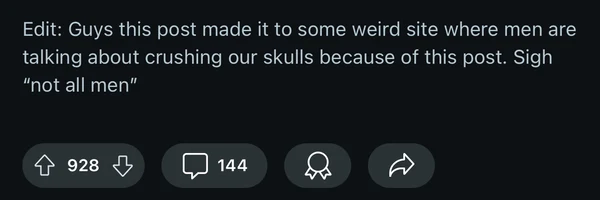In the last few weeks a trend emerged on TikTok where women explain how they spend money. But most importantly, they reveal how they make sense out of those expenses, even though some of them don't make sense. Lo and behold: girl math: https://tiktok.com/@danielasotohealth/video/7267396650690268417
It's over for market research-cels. Zoomers will tell you their spending habits unprompted for a bit of internet clout.
What does ‘girl math' look like?
1. Forgoing sales means losing money
Imagine you're at the mall, and you spot a cute handbag at a discounted price. You want this item and it's on sale — not buying it would be stupid, right? This is ‘girl math' and the marketing industry loves it.
 Brocels remind me to never share a bank account if I ever marry
Brocels remind me to never share a bank account if I ever marry
2. Skipping daily expenses makes you money
Say you love drinking coffee everyday. Where I live an espresso costs around €0.75 — I know, come to Portugal. If I don't buy coffee one day, that means I've made €0.75 for the day. Quick mafs.

3. Paying with cash is like paying with free money
The cash sitting on your wallet feels like Monopoly money. You don't see any charge in your bank account, you don't see the numbers drop, so it's not as painful.
I've always considered it low IQ behavior. What compels these people to publicly admit to it, and even associate it with your gender?
A Consumer Expenditure Survey by the U.S. Bureau of Labor Statistics found out the following: men spent an average of $41,203 a year as opposed to $38,838 by women. In absolute terms, men do spend more than women.
 Foidsisters we are so back, science has saved us once again with cold, hard facts.
Foidsisters we are so back, science has saved us once again with cold, hard facts.
However, when we take into account how much each gender earns on average, the story changes. According to the Census Current Population Survey, men earn an average of $76,460, whereas women take home $56,360. In other words, men spend $53.8 out of every $100 they earn, and women $68.9.
This is why fighting for equal wages is evidence based policy. It's basically like quantitative easing.










Jump in the discussion.
No email address required.
This is sort of correct. Not buying a widget for $X is the same, economically-speaking, as already owning that widget and selling it for $X.
Jump in the discussion.
No email address required.
Generate infinite money for yourself with this one glitch
Jump in the discussion.
No email address required.
More options
Context
Wow, such a wise aphorism from one of our greatest Founding Fathers!

Lmao stupid whore. Women are r-slurred

Jump in the discussion.
No email address required.
This but unironically
Jump in the discussion.
No email address required.
More options
Context
Benny Franklin
Franklin  was the original soyjak
was the original soyjak 
Jump in the discussion.
No email address required.
Also, absolute travesty that there's no B Frank Marsey
Jump in the discussion.
No email address required.
More options
Context
More options
Context
More options
Context
Jump in the discussion.
No email address required.
More options
Context
Your econ teacher was overemployed
Jump in the discussion.
No email address required.
"and selling it"
Every day that post about how 21% of people are functionally illiterate becomes more relevant.
Jump in the discussion.
No email address required.
it presumably generated non-monetary value for you while you owned it
Jump in the discussion.
No email address required.
More options
Context
What happens after the precondition that makes those two situations completely different is irrelevant.
Jump in the discussion.
No email address required.
Case 1: Buy $product for $100
Result: Wallet=0, products=1
Case 2: Don't buy $product for $100
Result: Wallet=100, products=0
Case 3: Sell $product for $100
Result: Wallet=100, products=0
Cases 2 & 3 are economically equivalent. In both situations, you've decided you value X dollars more highly than Y product.
Jump in the discussion.
No email address required.
Hey windowlicker
1:
Case 2: Don't buy $product for $100
Result: Wallet=100, products=0
Case 4: Perform $service for $100
Result: Wallet=200, products=0
These are the two scenarios that the girlmath talking point is comparing. It is about a feeling of having made money, and therefore now having additional money for other purchases.
2:
A consumer reselling a product does not give you retail value, it is not equivalent to not buying the item, and the relevant scenario does not already presuppose owning said item or an equivalent amount of money
Jump in the discussion.
No email address required.
No, the girlmath scenario is joking about how not buying something is the same as making money, and it is the same if you're considering selling something you own as one of the ways we might make money.
In fact, as you point out, avoiding buying something is better (economically speaking) than selling something, because we'd rarely get full retail value for used items.
Jump in the discussion.
No email address required.
Literally nobody is talking about selling something. The girlmath scenario is not selling anything. It is not directly comparable to any scenario in which they already possess something they desire to sell.
Making money means increasing in money. You do not make money by choosing not to lose money.
You don't have an income because you chose to stand around and do nothing, instead of throwing your money in a fire, which you totally could have done but didn't you money maker you.
You also have a few teachers in your history that need to be fired.
Jump in the discussion.
No email address required.
I'm talking about selling something. Selling things is one way to make money!
You don't think it be like it is but it do.
Jump in the discussion.
No email address required.
More options
Context
More options
Context
More options
Context
More options
Context
More options
Context
More options
Context
More options
Context
More options
Context
More options
Context